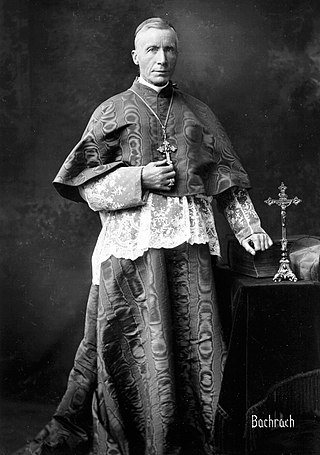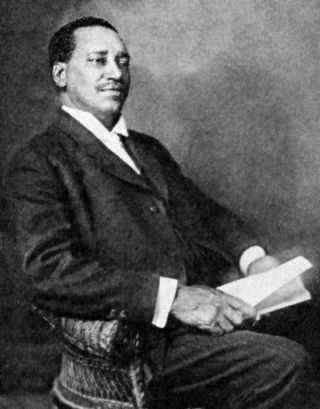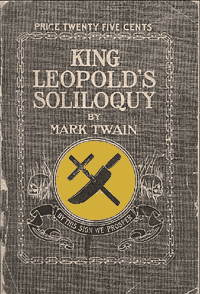
Leopold II was the second King of the Belgians from 1865 to 1909, and the founder and sole owner of the Congo Free State from 1885 to 1908.

Samuel Langhorne Clemens, known by the pen name Mark Twain, was an American writer, humorist, essayist, entrepreneur, publisher, and lecturer. He was praised as the "greatest humorist the United States has produced", and William Faulkner called him "the father of American literature". His novels include The Adventures of Tom Sawyer (1876) and its sequel, Adventures of Huckleberry Finn (1884), with the latter often called the "Great American Novel". Twain also wrote A Connecticut Yankee in King Arthur's Court (1889) and Pudd'nhead Wilson (1894), and co-wrote The Gilded Age: A Tale of Today (1873) with Charles Dudley Warner.

The Congo Free State, also known as the Independent State of the Congo, was a large state and absolute monarchy in Central Africa from 1885 to 1908. It was privately owned by King Leopold II, the constitutional monarch of the Kingdom of Belgium. In legal terms, the two separate nations were in a personal union. The Congo Free State was not a part of, nor did it belong to Belgium. Leopold was able to seize the region by convincing other European states at the Berlin Conference on Africa that he was involved in humanitarian and philanthropic work and would not tax trade. Via the International Association of the Congo, he was able to lay claim to most of the Congo Basin. On 29 May 1885, after the closure of the Berlin Conference, the king announced that he planned to name his possessions "the Congo Free State", an appellation which was not yet used at the Berlin Conference and which officially replaced "International Association of the Congo" on 1 August 1885. The Free State was privately controlled by Leopold from Brussels; he never went there.

King Leopold's Ghost: A Story of Greed, Terror and Heroism in Colonial Africa (1998) is a best-selling popular history book by Adam Hochschild that explores the exploitation of the Congo Free State by King Leopold II of Belgium between 1885 and 1908, as well as the large-scale atrocities committed during that period. The book, also a general biography of the private life of Leopold, succeeded in increasing public awareness of these crimes in recent decades.

James Cardinal Gibbons was a senior-ranking American prelate of the Catholic Church who served as apostolic vicar of the Apostolic Vicariate of North Carolina from 1868 to 1872, bishop of the Diocese of Richmond in Virginia from 1872 to 1877, and as ninth archbishop of the Archdiocese of Baltimore in Maryland from 1877 until his death. He was elevated to the rank of cardinal in 1886.

Edmund Dene Morel was a French-born British journalist, author, pacifist and politician.
The Congo Reform Association (CRA) was a political and humanitarian activist group that sought to promote reform of the Congo Free State, a private territory in Central Africa under the absolute sovereignty of King Leopold II. Active from 1904 to 1913, the association formed in opposition to the institutionalised practices of Congo Free State's 'rubber policy', which encouraged the need to minimise expenditure and maximise profit with no political constraints – fostering a system of coercion and terror unparalleled in contemporary colonial Africa. The group carried out a global publicity campaign across the Western world, using a range of strategies including displays of atrocity photographs; public seminars; mass rallies; celebrity endorsements; and extensive press coverage to lobby the Great Powers into pressuring reform in the Congo. The association partially achieved its aims in 1908 with the Belgian government's annexation of the Congo Free State and continued to promote reform until disbanding in 1913.

Belgium controlled several territories and concessions during the colonial era, principally the Belgian Congo from 1908 to 1960, Ruanda-Urundi from 1922 to 1962, and Lado Enclave from 1884 to 1910. It also had small concessions in Guatemala (1843–1854) and Belgian concession of Tianjin in China (1902–1931) and was a co-administrator of the Tangier International Zone in Morocco.

Msiri founded and ruled the Yeke Kingdom in south-east Katanga from about 1856 to 1891. His name is sometimes spelled 'M'Siri' in articles in French. Other variants are "Mziri", "Msidi", and "Mushidi"; and his full name was Mwenda Msiri Ngelengwa Shitambi.

The United States and Belgium maintain a friendly bilateral relationship. Continuing to celebrate cooperative U.S. and Belgian relations, 2007 marked the 175th anniversary of the nations' relationship.

William Henry Sheppard was one of the earliest African Americans to become a missionary for the Presbyterian Church. He spent 20 years in Africa, primarily in and around the Congo Free State, and is best known for his efforts to publicize the atrocities committed against the Kuba and other Congolese peoples by King Leopold II's Force Publique.

The Abir Congo Company was a company that exploited natural rubber in the Congo Free State, the private property of King Leopold II of Belgium. The company was founded with British and Belgian capital and was based in Belgium. By 1898 there were no longer any British shareholders and the Anglo-Belgian India Rubber Company changed its name to the Abir Congo Company and changed its residence for tax purposes to the Free State. The company was granted a large concession in the north of the country and the rights to tax the inhabitants. This tax was taken in the form of rubber obtained from a relatively rare rubber vine. The collection system revolved around a series of trade posts along the two main rivers in the concession. Each post was commanded by a European agent and manned with armed sentries to enforce taxation and punish any rebels.

Belgium–Congo relations refers to relations between the Kingdom of Belgium and the Democratic Republic of the Congo. The relationship started with the exploration of the Congo river by Henry Morton Stanley.

The Congo Free State propaganda war was a worldwide media propaganda campaign waged by both King Leopold II of Belgium and the critics of the Congo Free State and its atrocities. Leopold was very astute in using the media to support his virtual private control of the Congo. British campaigner Edmund Dene Morel successfully campaigned against Leopold and focused public attention on the violence of Leopold's rule. Morel used newspaper accounts, pamphlets, and books to publish evidence from reports, eye-witness testimony, and pictures from missionaries and others involved directly in the Congo. As Morel gained high-profile supporters, the publicity generated by his campaign eventually forced Leopold to relinquish control of the Congo to the Belgian government.

The Zappo Zaps were a group of Songye people from the eastern Kasaï region in what today is the Democratic Republic of the Congo. They acted as allies of the Congo Free State authorities, while trading in ivory, rubber and slaves. In 1899 they were sent out by the colonial administration to collect taxes. They massacred many villagers, causing an international outcry.
Alice, Lady Harris was an English missionary and an early documentary photographer. Her photography helped to expose the human rights abuses in the Congo Free State under the regime of King Leopold II of the Belgians.
Daniel Jacob Danielsen was a Faroese missionary and humanitarian worker.

From 1885 to 1908, many atrocities were committed in the Congo Free State under the absolute rule of King Leopold II of Belgium. These atrocities were particularly associated with the labour policies, enforced by colonial administrators, used to collect natural rubber for export. Combined with epidemic disease, famine, and falling birth rates caused by these disruptions, the atrocities contributed to a sharp decline in the Congolese population. The magnitude of the population fall over the period is disputed, with modern estimates ranging from 1.5 million to 13 million.
Relations between the Congo Free State and the United States began after recognition between the two states in 1885 when the Congo Free State was established. After Belgium under Leopold II annexed the Congo Free State in 1908, later becoming Belgian Congo, relations ceased between the two nations.















